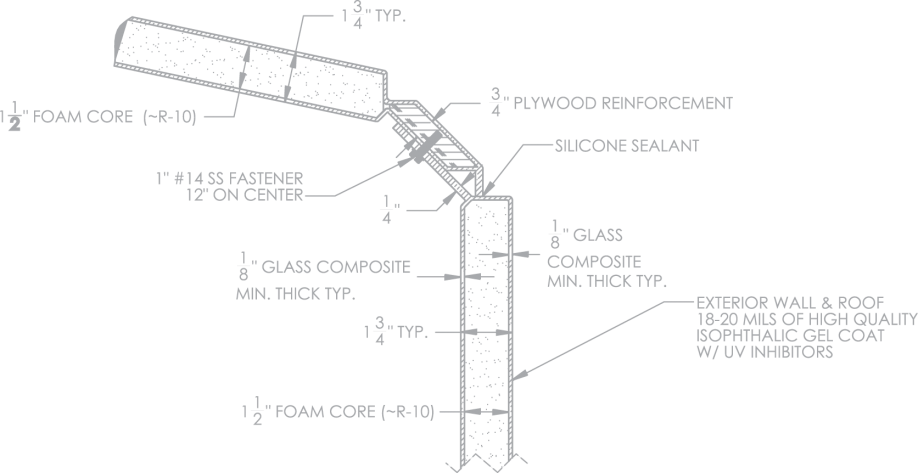The Benefits of Using Composites in Construction Materials
The Benefits of Using Composites in Construction Materials
Blog Article
Discovering the Uses and Advantages of Recycled Composites in Modern Industries
The amalgamation of recycled products with advanced composite modern technologies presents an appealing method for enhancing sustainability, durability, and cost-efficiency throughout various industries. As sectors seek ingenious remedies to deal with environmental worries and boost operational effectiveness, the unification of recycled composites emerges as an engaging option.
Ecological Advantages of Recycled Composites
The utilization of recycled composites in contemporary industries provides considerable ecological advantages, adding to the reduction of waste and the preservation of natural deposits. By incorporating recycled compounds into making procedures, sectors can decrease their dependence on virgin materials, thereby lowering the quantity of waste generated and the energy required for extraction and manufacturing. This change towards using recycled compounds assists in diverting products from landfills, easing the problem on waste administration systems, and lowering greenhouse gas discharges related to standard manufacturing methods.
Moreover, making use of recycled composites promotes the preservation of natural deposits such as lumber, minerals, and water, which are frequently diminished via the extraction and processing of resources (composites). By extending the lifespan of products through recycling, markets can help protect environments and biodiversity by decreasing the demand for new resources. Overall, the adoption of recycled compounds in modern-day markets plays an essential role in promoting sustainability and mitigating the ecological effect of manufacturing processes
Boosted Sturdiness in Item Production
With an emphasis on longevity and robustness, incorporating recycled compounds right into product manufacturing processes boosts sturdiness and sustainability. By utilizing recycled compounds, suppliers can develop products that are not just strong however likewise resistant to wear and tear, making them excellent for long-lasting usage in various industries. The combination of various materials in recycled compounds can frequently cause improved stamina and sturdiness compared to traditional materials, providing a cost-effective service for creating lasting products.
One of the essential benefits of using recycled composites in product manufacturing is the capability to customize the product properties to fulfill specific resilience demands. By adjusting the structure and manufacturing methods, suppliers can personalize the recycled composites to endure severe ecological conditions, heavy loads, or frequent usage without jeopardizing on efficiency. This flexibility in layout and production enables for the production of highly long lasting items that preserve their stability in time, minimizing the demand for regular substitutes and ultimately adding to an extra lasting production procedure.
Cost-Effectiveness and Financial Advantages
Incorporating recycled composites into item manufacturing not just enhances resilience and sustainability however additionally uses substantial cost-effectiveness and financial advantages. Utilizing recycled composites can lead to minimized material expenses as recycled products are often less costly than virgin products. Furthermore, reusing composite products can decrease garbage disposal expenses and reduce the demand for landfill area, adding to general expense financial savings for markets.

Development and Style Versatility With Recycled Compounds
Using recycled compounds in modern-day sectors offers unmatched opportunities for technology and design adaptability. By including recycled materials into composite manufacturing procedures, companies can press the boundaries of conventional style constraints and check out new opportunities. The versatility of recycled composites enables for the production of complex forms and structures that could not be achievable with standard materials.
Among the crucial advantages of recycled compounds is their ability to be built into different kinds, providing designers the flexibility to try out one-of-a-kind sizes and shapes. composites. This flexibility opens a globe of creative possibilities, enabling the growth of lightweight yet durable items that fulfill the particular demands of different industries
Furthermore, the usage my review here of recycled compounds promotes lasting practices and sustains the circular economy by lowering waste and lessening the environmental influence of manufacturing procedures. This concentrate on environment-friendly design options aligns with the growing trend in the direction of sustainability in contemporary sectors, making recycled composites a valuable resource for forward-thinking and innovative business.
Applications Across Various Industries
Recycled compounds find impactful and diverse applications throughout a wide variety of sectors due to their distinct residential or commercial properties and sustainability advantages. In the automobile industry, these products are increasingly used for manufacturing durable and lightweight parts, boosting gas performance and lowering carbon discharges. The aerospace market take advantage of recycled composites in the production of aircraft components, where the products' strength-to-weight proportion is critical for ensuring safety and performance. In construction, these composites are made use of for creating solid yet environmentally friendly building products, adding to sustainable facilities growth. The sustainable energy market uses recycled composites in wind turbine blades and solar panels, utilizing their stamina and resistance to extreme environmental problems. Furthermore, the marine sector uses these products for producing boat hulls and elements, providing boosted resilience and rust resistance. The adaptability and sustainability of recycled composites make them important across numerous sectors, driving advancement and environmental stewardship. composites.
Conclusion
To conclude, the utilization of recycled composites in contemporary sectors offers considerable ecological benefits, improved over at this website durability in product production, cost-effectiveness, and financial benefits. Furthermore, the use of recycled compounds enables development and style adaptability throughout various markets. In general, the fostering of recycled compounds offers a sensible and sustainable option for meeting the requirements of the market while additionally lowering environmental influence.

One of the crucial advantages of utilizing recycled composites in product manufacturing is the capability to tailor the material homes to meet certain longevity requirements. Making use of recycled compounds can lead to reduced material prices as recycled products are commonly much less pricey than virgin products. The aerospace market benefits from recycled compounds in the manufacturing of airplane parts, where the materials' strength-to-weight ratio is important for ensuring safety and security and efficiency.
Report this page